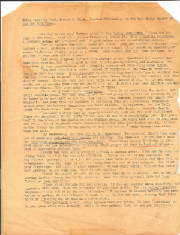BEST BRIEF WRITING GUIDE
"Any story properly covered is a feature story." -- Meyer Berger
 Notes taken by Prof. Edward A. Walsh, Fordham University, on the late Meyer Berger of The New York Times:
Notes taken by Prof. Edward A. Walsh, Fordham University, on the late Meyer Berger of The New York Times:
"The key to any good feature story is its 'utter simplicity.' Look for the core of the story.
Pick out a single thread and
follow it.
Have a logical beginning, a readable middle and a logical end. A good ending is not an artificial device.
"'Try to capture dimension, color and sound. LOOK AND LISTEN. A feature story conveys a mood, portrays
a character, describes a scene. There should be something of sound, lights and shadow, color in a story. Some stories you
see, some you hear, some you feel -- some have all of these.
"'Any story properly
covered is a feature story. Questions and answers may make good reading, but not so good as what is obtained by sitting and
listening. Be sensitive to your surroundings, get a complete picture and your story comes alive.
"'You
must exercise a certain amount of restraint or you will go overboard. Learn to pull the reins. Understatement is the most
important technique in writing, and the most difficult to learn. Do not overdo your tears, tragedy, humor -- always stop this
side of excess. Once you have made your point do not hammer at it. Do not add extra words, rather go over your copy and knock
them out. Pick out your best anecdote and discard the others. Make your point and leave it there.
"'Your
story must convey information. There is no substitute for facts. Get every possible detail you can, even if you are
not going to use it. If anything is -- or seems to be pertinent -- get it. You cannot fool readers, because you cannot fool
yourself. Get away from the tendency to introduce your own cleverness. Reporters should never get between themselves and their
readers. Be objective, let the facts speak for themselves. Make things specific -- a specific house, a specific family.
"'In doing a story that is largely interview, pick out the most significant lines and passages. Do not
quote by the yard -- do not do a stenographic job. Put yourself in the place of the person you are writing about. We write
best what we see, hear and feel. But if somebody else's viewpoint gets the idea over better use it. If the device throws the
writer in the shade, so much the better.' Make things come alive when you write.
"'In everything,
you have got to do reporting. The colorful things that come out of seemingly colorless occupations are amazing. Dig
them out. If you don't have the curiousity to drive you on, drop this work. There is no reason for being in this work
except for the intangibles -- curiosity about people and what is back of things -- back of apparently obvious facts. '
"Nobody has ever satisfactorily defined a feature story. Pick out the most exciting thing to rivet the
reader's attention. 'Never use 'I' or the editorial 'we'. Use dialect sparingly, if at all. Let people know there is a dialect,
but once that is established, drop it. Read up all the background you can on your subject. Get it at your fingertips. Put
meat in every sentence. Do not waste words. Collect ten times as much material as you will use. Weed it out rigidly.
"Watch the person you are writing about when he is in action. Get in the relieving lights. Watch for
little gestures. Live the other person's life but keep factual -- keep specific.
"There is
no formula for questioning. If you are curious about something, the questions will come. Your own curiosity is your best guide.
Use the calmest possible language -- in the end it is the most effective. It is hard to discard material you have worked to
gather, it is difficult to learn to do it, but you must. A story that takes hours of listening may be read in a few minutes.
"Your personality will shine through what you write. If that 'something' is in
you, your style will develop. Write in your natural form, do not get artificial."
STIMULATING QUOTE:
"Stories are for joining the past to the future." -- Tim O'Brien, novelist.